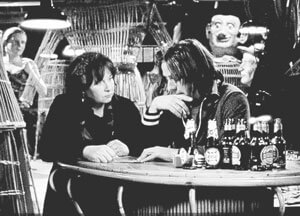Volume 5, Number 2 | January 12-18, 2006
Stunted Emotional Tides
“When the Sea Rises,” based in a lovely concept, never crests
When the Sea Rises
Directed by Gilles Porte and Yolande Moreau
In French with English subtitles
New Yorker Films
Opens Jan. 13
Lincoln Plaza, Cinema Village
One walks out of “When the Sea Rises” wondering if a reel got misplaced somewhere. The film chronicles a relationship between Irene (co-director Moreau), a middle-aged performer, and Dries (Wim Willaert), a younger man who becomes her lover and onstage foil. However, nothing much seems to be at stake. “When the Sea Rises” isn’t “slow” in the way that many European art films are — there are no five-minute tracking shots — but it takes a great deal of time getting to the heart of its subject. An hour passes before Irene and Dries share their first kiss. Half an hour later, “When the Sea Rises” is over. Essentially, it feels like an extended short. At worst, it’s anecdotal; at best, it seems like a decent short story. There’s no real cinematic equivalent to that form — unless one counts made-for-TV work like Showtime’s “Masters of Horror” series — and as a result, “When the Sea Rises” is either 30 minutes too short or too long.
It opens with close-ups of Irene’s body; at first, they’re too tight to give away gender. She paints her arms and hands with red paint and takes out two water pistols. A clown, comedian and/or performance artist, she tours France and Belgium with a one-woman show, “Dirty Business.” Onstage, she wears a mask that covers most of her face, hands and arms painted red, and clothes stained with red paint. Her persona is a cynical old woman. At times, there’s even something confrontational about her performance. She talks about committing a crime and then mentions the death of her lover. When the audience takes it as a joke, she feigns outrage. “That’s all it means to ya?” she says; and then says she didn’t take it very seriously either. Each night, Irene pulls a randomly selected “chicken” from the audience to appear with her.
A married mother, she’s comfortable touring alone, keeping in touch with her family via her cell phone. One day, her car stalls. Dries (Willaert) helps fix her car. He works in a vegetable stand but his real passion is collecting costumes of carnival giants. She gives him a ticket to her performance and selects him as her onstage participant. He’s soon hooked and keeps coming back to “Dirty Business.” Casually, he quits his job to go on the road with her, and becomes her chicken, appearing with her every night. The two travel across northern France together and gradually fall in love.
In an American film, Irene would be at least ten years younger and twenty pounds lighter. It’s refreshing to see a love story in which a middle-aged woman gets to sleep with a younger man — Rob Reiner’s “Rumor Has It…” where Jennifer Anniston has a one-night stand with Kevin Costner, is more typical of male fantasy-driven romances. Moreau’s performance evokes Giuletta Masina in Fellini films like “La Strada” and “The Nights of Cabiria,” although Irene is far less naive and more independent than Masina’s waiflike, easily wounded characters. With shoulder-length hair, Dries looks like Iggy Pop circa the late 70s, around the time he kicked his self-destructive habits and started singing about his lust for life.
“When the Sea Rises” was obviously a deeply personal film for Moreau. “Dirty Business” is based on her own work. She seems to know the backwaters of France intimately. For all its flaws, the film is palpably grounded in the real experience of touring. Irene entertains a rather marginal milieu — in addition to small town cultural centers, she appears at a retirement home and beauty pageant. Her status as an outsider rhymes with Dries’ passion for carnival parades. Apart from a few songs—Irene and Dries share a lovely dance to one onstage—pop culture is notably missing from “When the Sea Rises.” Porte and Moreau depict a world where older, more traditional forms of culture still thrive. In Irene’s imagination, Dries is a knight on a horse and an industrial wasteland, closed to public traffic, is a pirate’s kingdom.
Greek director Theo Angelopolous’ “The Traveling Players” and Chinese director Jia Zhang Ke’s “Platform” used the lives of performers on the road as a launching pad for ambitious historical allegories. “When the Sea Rises” takes the exact opposite approach, concentrating on a small amount of space and time. Unfortunately, its emotional landscape is equally small. As a mash note to the French countryside, it works well, but as a love story, it’s tepid and lightweight to the point of triviality.
In “When the Sea Rises,” Irene, played Yolande Moreau, who also co-directs, is a middle-aged clown an performance artist, who is joined by Wim Willaert’s Dries, a younger man, as she travels the backwaters of northern France.
gaycitynews.com




































